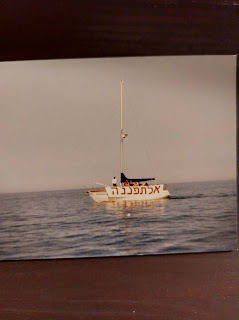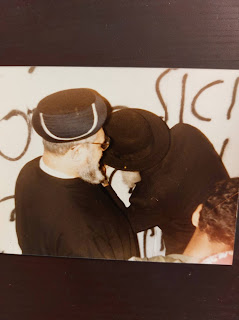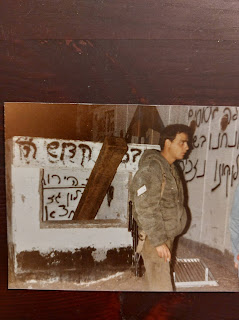Meir Y. Soloveichik: Moshe Dayan’s Tragic Blunder
There is an argument to be made for permitting wider access and the right to pray for Jews at the site of the biblical Temples. In part, this argument charges that defense minister Moshe Dayan, in electing not to fully realize Israel’s sovereignty over the Mount immediately after its breathtaking capture in the 1967 war, helped facilitate the resonant Palestinian lie that the Jews have no connection to our ancient homeland—for surely, if the Temple Mount was historically ours, religiously ours, we would not have handed it back to them.Mahmoud Abbas’ Dissertation
Dayan self-evidently thought otherwise. Anxious to avoid a full-on confrontation with the entire Muslim world, and utilizing the halachic argument that Jews should not set foot on the Mount for fear of defiling the sacred ground where the Temple and its Holy of Holies once stood, he allowed Jordan’s Muslim Waqf to continue to administer the compound’s holy places.
Netanyahu, Horovitz continued, had “wisely” adopted Dayan’s approach previously, but now the prime minister had “sanctioned” an act of “potential pyromania.” Horovitz’s account leaves out the fact that the decision of the ardently secular Dayan was founded on total disregard for what the Temple Mount meant to religious Jews.
After his paratroopers broke through Jordanian lines in 1967 and reached the site, Mordechai Gur exultantly exclaimed that “the Temple Mount is in our hands.” Dayan, in contrast, infamously reflected, “What do I need this Vatican for?” As the Israeli journalist Nadav Sharagai has documented, Dayan’s actions were based in the presumption that the Temple Mount is not of any religious significance to Jews at all:
Dayan thought at the time, and years later committed his thoughts to writing, that since the Mount was a “Muslim prayer mosque,” while for Jews it was no more than “a historical site of commemoration of the past…one should not hinder the Arabs behaving there as they do now and one should recognize their right as Muslims to control the site.”
But of course the Temple Mount is more, for Jews, than a commemorative locale of the past: It is the holiest site in Judaism, the one toward which Jews pray all over the world, because they believe that God dwells there in a special way. Dayan’s decision did indeed facilitate Palestinian claims, rampant today, that no Temple ever stood in Jerusalem and that the entire Jewish connection to Jerusalem is a fabrication. This is why more and more religious Jews are realizing that visiting the site is essential. It is not only far-right figures who are visiting the Mount. Entering certain sections of the Mount in a manner sanctioned by Jewish law is becoming more and more mainstream among Orthodox Jews. And that is why opposition to Jewish access to the Mount is growing more and more frantic by the day.
All this points to a profound irony. The return of Netanyahu has been met with the journalistic gnashing of teeth and the rhetorical rending of garments by writers and public figures about the danger that the (democratically elected) government of Israel poses to democracy. And yet it is these very critics who are often so dismissive of the most elemental of democratic injustices: denying Jews in Israel the right to visit, and to pray at, Judaism’s holiest place. Perhaps, when it comes to the history of the democratic liberties of mankind in the eyes of those who piously intone on the subject, it is only the rights of religious Jews that do not matter.
On Feb. 1, 1972, the Central Committee of the Communist Party of the Soviet Union issued a directive “On further measures to fight anti-Soviet and anti-communist activities of international Zionism.” The social sciences section of the Soviet Academy of Sciences soon established a permanent commission for the coordination of scientific criticism of Zionism, to be housed at the academy’s prestigious Institute of Oriental Studies. Over the next 15 years, the IOS would serve as an important partner in the state’s fight against the imaginary global Zionist conspiracy that Soviet security services believed was sabotaging the USSR in the international arena and at home. In 1982, the IOS would grant the doctoral status to one Mahmoud Abbas, upon the defense of his thesis The Relationship Between Zionists and Nazis, 1933-1945.Why Israel’s enemies will hate the Louvre
Abbas’ dissertation has been a subject of considerable interest over the years. The thesis isn’t publicly available: By all accounts, it is kept in an IOS special storage facility requiring special authorization to access. But if one visits the National Library of Israel in Jerusalem, one can easily get the Palestinian leader’s so-called avtoreferat—an extended dissertation abstract. Written to the standards of the Soviet State Commission for Academic Degrees and Titles and authored by the candidate, the 19-page document outlines the dissertation’s relevance, methodology, main arguments and unique contribution to the field. It also provides a literature review and lists the individuals and institutions that were involved in shepherding the work through to completion. It therefore offers a peek not only into Mahmoud Abbas’ academic accomplishment, but also into the system that produced it.
Using the social sciences to support political and ideological agendas set by the Communist Party was a matter of course in the USSR. Entire academic disciplines had been established to grant scholarly legitimacy to the state’s guiding ideology. “Scientific atheism,” for an example, was tasked with proving scientifically that God did not exist and that religion was the opiate of the masses. “Scientific communism” was supposed to supply scientific proof that communism was the superior stage of social and economic development and would supersede both Soviet socialism and global capitalism. When, instead, capitalism superseded Soviet socialism and the cushy budgets that sustained these disciplines vanished, they, too, quietly dissolved.
As a field, “scientific anti-Zionism” never took root in the Soviet academy as broadly as the other two subjects. Like them, it died as soon as its primary client—the Soviet state—disappeared. Soon a million Soviet Jews resettled in Israel and the newly independent former Soviet states restored diplomatic relations with the country.
I grew up in Akademgorodok—a suburb of the Siberian city of Novosibirsk that was home to the Siberian Division of the Academy of Sciences. Adults around me lived and breathed science—real science, like physics and biology. It was well-known that portions of the academy were corrupted by ideological agendas. The antisemitism in its math division and elsewhere was a fact of life. Humanities and social sciences in particular were ruled by ideological priorities. But seeing the intellectual corruption that is evident in the story of Abbas’ dissertation is disturbing nonetheless.
The Palestinian Authority and its supporters have a new enemy: the Louvre.
The world’s most-visited museum, the famous French institution that holds some of the greatest works of art and antiquities, is likely to find itself on anti-Israel boycott lists around the world.
This is because among the Louvre’s storied collections is a slab of stone with an inscription that affirms the ancient connection of the Jewish people to the Land of Israel.
The stone, known as the Mesha Stele, was first discovered in 1868 near the Dead Sea, but its inscription, written in the language of the ancient Moabites, was only partially understandable due to centuries of wear and damage. The inscription recounts a war between King Mesha of Moab and the Jews—the same conflict described in the third chapter of the Book of Kings. In addition, the words “House of David” appeared to be included in the inscription, but damage to the artifact meant this could not be proved conclusively.
Linguists and historians associated with a University of Southern California research project recently analyzed the artifact with a new technology called Reflectance Transformation Imaging that “takes digital images of an artifact from different angles and then combined to create a precise, three-dimensional digital rendering of the piece,” according to an article by two of the researchers, André Lemaire and Jean-Philippe Delorme, in the latest issue of Biblical Archeology Review.
This allowed the damaged section of the stele to be read. As was long suspected, it indeed referred to the “House of David.” So, once again, archaeological discoveries have affirmed what was already written long ago in the Hebrew Bible.
Do you know what is not mentioned in the inscription? “Palestine” or “Palestinians.”













































.jpg)




